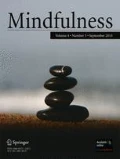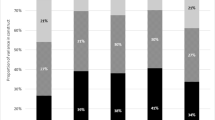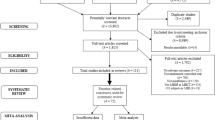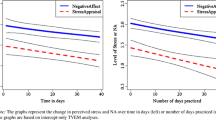Abstract
Objectives
Whereas much research has demonstrated the effects of mindfulness-based interventions on emotional well-being, less work has examined the effects of mindfulness training on affect dynamics, referring to the dynamic processes through which affect fluctuates in daily life. The present study investigated the effects of a mindfulness-based stress reduction program (MBSR) versus an active control condition (music therapy stress reduction, MTSR) on several indicators of affect dynamics, namely affect variability, affect instability, and affect inertia, and difficulties with emotion regulation in a Chinese adult sample based in Singapore.
Methods
One hundred and fifty-eight participants were recruited and randomly assigned to receive MBSR or MTSR. Participants completed a battery of questionnaires, followed by 3 days of ecological momentary assessment (EMA) measuring a variety of emotions at pre- and post-intervention. Of these participants, 121 provided baseline EMA data.
Results
Intent-to-treat analyses (n = 121) indicated that participants in the MBSR condition showed significantly greater decreases in variability (p < .001) and instability of negative affect (p < .001), and emotion regulation difficulties (p = .040) compared to the MTSR group. No between-condition differences were found on changes in affect inertia and any of the affect dynamic indicators for positive emotions.
Conclusions
The study suggests that MBSR may have a unique impact on dynamics of negative, as opposed to positive emotions. The findings lend further support to the role of mindfulness training in facilitating effective regulation of negative emotions in the context of everyday life.

Similar content being viewed by others
References
Adams, C. E., Chen, M., Guo, L., Lam, C. Y., Stewart, D. W., Correa-Fernández, V., Cano, M. A., Heppner, W. L., Vidrine, J. I., Li, Y., Ahluwalia, J. S., Cinciripini, P. M., & Wetter, D. W. (2014). Mindfulness predicts lower affective volatility among African Americans during smoking cessation. Psychology of Addictive Behaviors, 28(2), 580–585. https://doi.org/10.1037/a0036512.
Arch, J. J., & Craske, M. G. (2006). Mechanisms of mindfulness: Emotion regulation following a focused breathing induction. Behaviour Research and Therapy, 44(12), 1849–1858. https://doi.org/10.1016/j.brat.2005.12.007.
Bartlett, L., Martin, A., Neil, A. L., Memish, K., Otahal, P., Kilpatrick, M., & Sanderson, K. (2019). A systematic review and meta-analysis of workplace mindfulness training randomized controlled trials. Journal of Occupational Health Psychology, 24, 108–126. https://doi.org/10.1037/ocp0000146.
Brose, A., Voelkle, M. C., Lövdén, M., Lindenberger, U., & Schmiedek, F. (2015). Differences in the between-person and within-person structures of affect are a matter of degree. European Journal of Personality, 29(1), 55–71. https://doi.org/10.1002/per.1961.
Bruscia, K. (2014). Defining music therapy (2nd ed.). Gilsum, NH: Barcelona Pub.
Cranford, J. A., Shrout, P. E., Iida, M., Rafaeli, E., Yip, T., & Bolger, N. (2006). A procedure for evaluatng sensitivoity to within-person change: Can mood measures in diary studies detect change reliably? Personality and Social Psychology Bulletin, 32(7), 917–929. https://doi.org/10.1177/0146167206287721.
Daly, M., Delaney, L., Doran, P. P., & MacLachlan, M. (2011). The role of awakening cortisol and psychological distress in diurnal variations in affect: A day reconstruction study. Emotion, 11(3), 524–532. https://doi.org/10.1037/a0022590.
DeNeve, K. M., & Cooper, H. (1998). The happy personality: A meta-analysis of 137 personality traits and subjective well-being. Psychological Bulletin, 124(2), 197–229. https://doi.org/10.1037/0033-2909.124.2.197.
Ebner-Priemer, U. W., Welch, S. S., Grossman, P., Reisch, T., Linehan, M. M., & Bohus, M. (2007). Psychophysiological ambulatory assessment of affective dysregulation in borderline personality disorder. Psychiatry Research, 150, 265–275.
Eid, M., & Diener, E. (1999). Intraindividual variability in affect: Reliability, validity, and personality correlates. Journal of Personality and Social Psychology, 76(4), 662–676. https://doi.org/10.1037/0022-3514.76.4.662.
Fredrickson, B. L., Cohn, M. A., Coffey, K. A., Pek, J., & Finkel, S. M. (2008). Open hearts build lives: Positive emotions, induced through loving-kindness meditation, build consequential personal resources. Journal of Personality and Social Psychology, 95(5), 1045–1062.
Garland, E. L., Geschwind, N., Peeters, F., & Wichers, M. (2015). Mindfulness training promotes upward spirals of positive affect and cognition: Multilevel and autoregressive latent trajectory modeling analyses [Original Research]. Frontiers in Psychology, 6(15). https://doi.org/10.3389/fpsyg.2015.00015.
Geschwind, N., Peeters, F., Drukker, M., van Os, J., & Wichers, M. (2011). Mindfulness training increases momentary positive emotions and reward experience in adults vulnerable to depression: A randomized controlled trial. Journal of Consulting and Clinical Psychology, 79(5), 618–628. https://doi.org/10.1037/a0024595.
Goldberg, S. B., Tucker, R. P., Greene, P. A., Davidson, R. J., Wampold, B. E., Kearney, D. J., & Simpson, T. L. (2018). Mindfulness-based interventions for psychiatric disorders: A systematic review and meta-analysis. Clinical Psychology Review, 59, 52–60. https://doi.org/10.1016/j.cpr.2017.10.011.
Goldin, P. R., & Gross, J. J. (2010). Effects of mindfulness-based stress reduction (MBSR) on emotion regulation in social anxiety disorder. Emotion, 10(1), 83–91. https://doi.org/10.1037/a0018441.
Gratz, K. L., & Roemer, L. (2004). Multidimensional assessment of emotion regulation and dysregulation: Development, factor structure, and initial validation of the Difficulties in Emotion Regulation Scale. Journal of Psychopathology and Behavioral Assessment, 26, 41–54.
Gratz, K. L., & Tull, M. T. (2010). Emotion regulation as a mechanism of change in acceptance-and mindfulness-based treatments. In R. A. Baer (Ed.), Assessing mindfulness and acceptance processes in clients: Illuminating the theory and practice of change (pp. 107–130). Context Press.
Hill, C. L. M., & Updegraff, J. A. (2012). Mindfulness and its relationship to emotional regulation. Emotion, 12(1), 81–90. https://doi.org/10.1037/a0026355.
Hofmann, S. G., Sawyer, A. T., Witt, A. A., & Oh, D. (2010). The effect of mindfulness-based therapy on anxiety and depression: A meta-analytic review. Journal of Consulting and Clinical Psychology, 78(2), 169–183. https://doi.org/10.1037/a0018555.
Jahng, S., Wood, P. K., & Trull, T. J. (2008). Analysis of affective instability in ecological momentary assessment: Indices using successive difference and group comparison via multilevel modeling. Psychological Methods, 13(4), 354–375. https://doi.org/10.1037/a0014173.
Jones, D. R., Graham-Engeland, J. E., Smyth, J. M., & Lehman, B. J. (2018). Clarifying the associations between mindfulness meditation and emotion: Daily high- and low-arousal emotions and emotional variability. Applied Psychology, 10(3), 504–523. https://doi.org/10.1111/aphw.12135.
Kabat-Zinn, J. (1990). Full catastrophe living: How to cope with stress, pain and illness using mindfulness meditation. Bantam Dell.
Kabat-Zinn, J. (1994). Wherever you go there you are: Mindfulness meditation in everyday life. Hyperion.
Keng, S.-L., & Tan, H. H. (2018). Effects of brief mindfulness and loving-kindness meditation inductions on emotional and behavioral responses to social rejection among individuals with high borderline personality traits. Behaviour Research and Therapy, 100, 44–53. https://doi.org/10.1016/j.brat.2017.11.005.
Keng, S. L., & Tong, E. M. (2016). Riding the tide of emotions with mindfulness: Mindfulness, affect dynamics, and the mediating role of coping. Emotion, 16(5), 706–718. https://doi.org/10.1037/emo0000165.
Keng, S.-L., Smoski, M. J., & Robins, C. J. (2011). Effects of mindfulness on psychological health: A review of empirical studies. Clinical Psychology Review, 31(6), 1041–1056. https://doi.org/10.1016/j.cpr.2011.04.006.
Keng, S.-L., Looi, P. S., Tan, E. L. Y., Yim, O.-S., Lai, P. S., Chew, S. H., & Ebstein, R. P. (2020). Effects of mindfulness-based stress reduction on psychological symptoms and telomere length: A randomized active-controlled trial. Behavior Therapy. https://doi.org/10.1016/j.beth.2020.01.005.
Knowles, R., Tai, S., Jones, S. H., Highfield, J., Morriss, R., & Bentall, R. P. (2007). Stability of self-esteem in bipolar disorder: Comparisons among remitted bipolar patients, remitted unipolar patients and healthy controls1. Bipolar Disorders, 9(5), 490–495. https://doi.org/10.1111/j.1399-5618.2007.00457.x.
Koons, C. R., Robins, C. J., Lindsey Tweed, J., Lynch, T. R., Gonzalez, A. M., Morse, J. Q., Bishop, G. K., Butterfield, M. I., & Bastian, L. A. (2001). Efficacy of dialectical behavior therapy in women veterans with borderline personality disorder. Behavior Therapy, 32(2), 371–390 https://doi.org/10.1016/S0005-7894(01)80009-5.
Koval, P., & Kuppens, P. (2012). Changing emotion dynamics: Individual differences in the effect of anticipatory social stress on emotional inertia. Emotion, 12(2), 256–267. https://doi.org/10.1037/a0024756.
Koval, P., Kuppens, P., Allen, N. B., & Sheeber, L. (2012). Getting stuck in depression: The roles of rumination and emotional inertia. Cognition & Emotion, 26(8), 1412–1427. https://doi.org/10.1080/02699931.2012.667392.
Koval, P., Pe, M. L., Meers, K., & Kuppens, P. (2013). Affect dynamics in relation to depressive symptoms: Variable, unstable or inert? Emotion, 13(6), 1132–1141. https://doi.org/10.1037/a0033579.
Kuppens, P., Van Mechelen, I., Nezlek, J. B., Dossche, D., & Timmermans, T. (2007). Individual differences in core affect variability and their relationship to personality and psychological adjustment. Emotion, 7(2), 262–274. https://doi.org/10.1037/1528-3542.7.2.262.
Kuppens, P., Allen, N. B., & Sheeber, L. B. (2010). Emotional inertia and psychological maladjustment. Psychological Science, 21(7), 984–991. https://doi.org/10.1177/0956797610372634.
Kuyken, W., Warren, F. C., Taylor, R. S., Whalley, B., Crane, C., Bondolfi, G., et al. (2016). Efficacy of mindfulness-based cognitive therapy in prevention of depressive relapse: An individual patient data meta-analysis from randomized trials. JAMA Psychiatry, 73(6), 565–574. https://doi.org/10.1001/jamapsychiatry.2016.0076.
MacCoon, D. G., Imel, Z. E., Rosenkranz, M. A., Sheftel, J. G., Weng, H. Y., Sullivan, J. C., Bonus, K. A., Stoney, C. M., Salomons, T. V., Davidson, R. J., & Lutz, A. (2012). The validation of an active control intervention for Mindfulness Based Stress Reduction (MBSR). Behaviour Research and Therapy, 50(1), 3–12. https://doi.org/10.1016/j.brat.2011.10.011.
Neumann, A., van Lier, P. A. C., Frijns, T., Meeus, W., & Koot, H. M. (2011). Emotional dynamics in the development of early adolescent psychopathology: A one-year longitudinal study. Journal of Abnormal Child Psychology, 39(5), 657–669. https://doi.org/10.1007/s10802-011-9509-3.
Palmier-Claus, J. E., Taylor, P. J., Gooding, P., Dunn, G., & Lewis, S. W. (2012). Affective variability predicts suicidal ideation in individuals at ultra-high risk of developing psychosis: An experience sampling study. The British Journal of Clinical Psychology, 51(1), 72–83. https://doi.org/10.1111/j.2044-8260.2011.02013.x.
Peeters, F., Berkhof, J., Delespaul, P., Rottenberg, J., & Nicolson, N. A. (2006). Diurnal mood variation in major depressive disorder. Emotion, 6(3), 383–391. https://doi.org/10.1037/1528-3542.6.3.383.
Robins, C. J., Keng, S.-L., Ekblad, A. G., & Brantley, J. G. (2012). Effects of mindfulness-based stress reduction on emotional experience and expression: A randomized controlled trial. Journal of Clinical Psychology, 68(1), 117–131. https://doi.org/10.1002/jclp.20857.
Rowland, Z., Wenzel, M., & Kubiak, T. (2020). A mind full of happiness: How mindfulness shapes affect dynamics in daily life. Emotion, 20(3), 436–451. https://doi.org/10.1037/emo0000562.
Shapiro, S. L., Carlson, L. E., Astin, J. A., & Freedman, B. (2006). Mechanisms of mindfulness. Journal of Clinical Psychology, 62, 373–386. https://doi.org/10.1002/jclp.20237.
Suls, J., Green, P., & Hillis, S. (1998). Emotional reactivity to everyday problems, affective inertia, and neuroticism. Personality and Social Psychology Bulletin, 24(2), 127–136. https://doi.org/10.1177/0146167298242002.
Thompson, R. J., Berenbaum, H., & Bredemeier, K. (2011). Cross-sectional and longitudinal relations between affective instability and depression. Journal of Affective Disorders, 130(1), 53–59. https://doi.org/10.1016/j.jad.2010.09.021.
Tolpin, L. H., Cimbolic Gunthert, K., Cohen, L. H., & O'Neill, S. C. (2004). Borderline personality features and instability of daily negative affect and self-esteem. Journal of Personality, 72(1), 111–138. https://doi.org/10.1111/j.0022-3506.2004.00258.x.
Toneatto, T., & Nguyen, L. (2007). Does mindfulness meditation improve anxiety and mood symptoms? A review of the controlled research. The Canadian Journal of Psychiatry/La Revue Canadienne de Psychiatrie, 52(4), 260–266.
Trull, T. J., Lane, S. P., Koval, P., & Ebner-Priemer, U. W. (2015). Affective dynamics in psychopathology. Emotion Review, 7(4), 355–361. https://doi.org/10.1177/1754073915590617.
Wichers, M., Peeters, F., Geschwind, N., Jacobs, N., Simons, C. J. P., Derom, C., Thiery, E., Delespaul, P. H., & van Os, J. (2010). Unveiling patterns of affective responses in daily life may improve outcome prediction in depression: A momentary assessment study. Journal of Affective Disorders, 124(1), 191–195. https://doi.org/10.1016/j.jad.2009.11.010.
Woyshville, M. J., Lackamp, J. M., Eisengart, J. A., & Gilliland, J. A. M. (1999). On the meaning and measurement of affective instability: Clues from chaos theory. Biological Psychiatry, 45(3), 261–269. https://doi.org/10.1016/S0006-3223(98)00152-8.
Acknowledgements
The study team would like to acknowledge Anne Chong, Ha My Bui, Evelyn Lee, Sheryl Bathman, Ai Tee Ho, Lynn Yi Xiu Koh, and Chi-Yen Chang for their valuable contributions to the study.
Funding
This work was funded by the Templeton World Charity Foundation Grant (TWCF0087) awarded to PSL and RPE.
Author information
Authors and Affiliations
Contributions
SLK: conceptualized and designed the study, and drafted the manuscript. EMWT: conducted data analyses and drafted the manuscript. ELYT: conducted data analyses. RPE: conceptualized the study. PSL: reviewed and edited the manuscript. Shian-Ling Keng and Eddie M. W. Tong share co-first authorship, while Richard P. Ebstein and Poh San Lai share co-last authorship on this manuscript.
Corresponding author
Ethics declarations
The funding source was not involved in the study’s design, interpretation of the results, or the preparation of this manuscript.
Ethical approval
All procedures performed in studies involving human participants were in accordance with the ethical standards of the institutional and/or national research committee and with the 1964 Helsinki declaration and its later amendments or comparable ethical standards. The study was approved by National University of Singapore’s Institutional Review Board.
Informed Consent
Informed consent was obtained from all individual participants included in the study.
Conflict of Interest
The authors declare no competing interests.
Additional information
Publisher’s Note
Springer Nature remains neutral with regard to jurisdictional claims in published maps and institutional affiliations.
Supplementary Information
ESM 1
(DOCX 70 kb)
Rights and permissions
About this article
Cite this article
Keng, SL., Tong, E.M.W., Yan, E.T.L. et al. Effects of Mindfulness-Based Stress Reduction on Affect Dynamics: a Randomized Controlled Trial. Mindfulness 12, 1490–1501 (2021). https://doi.org/10.1007/s12671-021-01617-5
Accepted:
Published:
Issue Date:
DOI: https://doi.org/10.1007/s12671-021-01617-5




